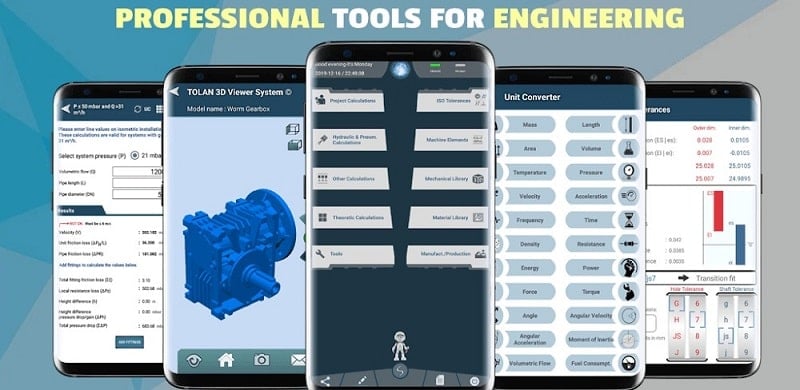Engineering Tools: A Comprehensive Solution for Mechanical Engineering
Engineering Tools stands out as a powerful and scalable solution for performing complex calculations and identifying critical mechanical elements in various projects. Beyond its computational capabilities, it offers extensive mechanical property values for a wide range of materials. Engineers can leverage this data to evaluate material properties and ensure they align with project requirements. These features significantly enhance the performance, safety, and design of mechanical engineering projects and applications.
Extensive Library of Mechanical Components
One of the standout features of Engineering Tools is its vast and diverse library of essential mechanical components. The program provides detailed explanations of the structure and operation of parts such as gearboxes, pillow blocks, pulleys, gears, bearings, bolts, nuts, fans, and measuring instruments. Designed for mechanical engineers and engineering students, this library offers accurate technical information and 3D views of components, enabling users to visualize and interact with parts effectively. This functionality helps users better understand how these components function in real-world scenarios, improving design and calculation processes.
Versatile Calculation Capabilities
Engineering Tools is not just a library; it is also a robust calculation tool tailored for mechanical engineers and industry professionals. The program supports a wide range of calculations to meet diverse user needs. For instance, it includes comprehensive heat loss calculation features to evaluate system performance and heat dissipation. Additionally, it provides tools for natural gas and ventilation system installation calculations, offering critical data for designing and constructing these systems. Engineers can also benefit from features like pipe diameter estimation, circulation pump calculations, and hydraulic system analysis, which are essential for optimizing mechanical projects.
Applications Across Mechanical Engineering
Engineering Tools excels in assisting with calculations and designs across various critical areas of mechanical engineering. Its diverse features enable professionals to tackle complex tasks with ease. Examples include calculating cutting conditions, designing pressure vessels, estimating bearing performance, and converting material hardness values. These capabilities are particularly valuable in industries like chemical, oil, and gas, where determining material load-carrying capacity and ensuring compliance with safety regulations are paramount. By minimizing errors and risks, Engineering Tools helps improve the performance, longevity, and quality of mechanical projects and products.
Material Property Analysis and Unit Conversion
Another significant advantage of Engineering Tools is its ability to quickly gather and utilize mechanical information. The program provides data on 73 distinct materials, each with 15 mechanical property values. This allows engineers to efficiently compare and select the best materials for specific applications, ensuring project safety and efficiency. Additionally, the software includes a comprehensive unit conversion tool with over 26 categories, enabling users to convert between hundreds of units of measurement. This feature spans basic scientific units to specialized engineering units, making it an invaluable resource for professionals.
Conclusion
Engineering Tools serves as a vital resource center for designing, calculating, and building mechanical engineering projects. Its extensive library, versatile calculation capabilities, and material analysis tools empower users to ensure project performance and quality with professionalism and efficiency. Whether you’re an engineer or a student, this tool is an essential asset for tackling the complexities of mechanical engineering.


